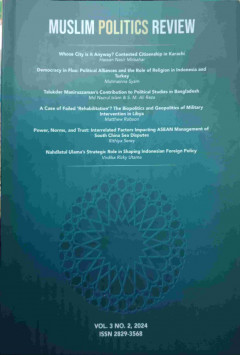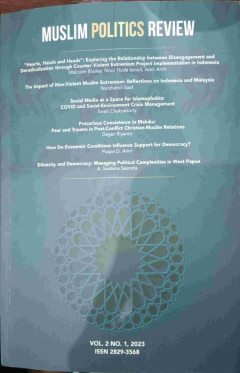Ditapis dengan

Nahdlatul Ulama's Strategic Role in Shaping Indonesian Foreign Policy
This article analyses the strategic influence of Nahdlatul Ulama (NU) on Indonesian foreign policy using constructivist theory and social identity theory as frameworks. It contends that NU's contributions are motivated by its intrinsic identity and principles, including the promotion of moderate Islam, rather than by external influences. This research utilizes the G20 Religion Forum (R20) and t…
- Edisi
- VOL. 3 NO. 2
- ISBN/ISSN
- 2829-3568
- Deskripsi Fisik
- 33 hlm, 28 cm
- Judul Seri
- -
- No. Panggil
- J 297.272 Mus

Talukder Maniruzzaman's Contribution to Political Studies in Bangladesh
This article aims to present and review his contribution to political science research in Bangladesh. Maniruzzaman's studies largely investigated the interconnections of colonialism, nationalism, and post-colonial state frameworks in Bangladesh and adjacent areas. His thesis critically examined the influence of colonial legacies on the contemporary political scene, highlighting the enduring nat…
- Edisi
- VOL. 3 NO. 2
- ISBN/ISSN
- 2829-3568
- Deskripsi Fisik
- 39 hlm, 28 cm
- Judul Seri
- -
- No. Panggil
- J 297.272 Mus

Power, Norms, and Trust: Interrelated Factors Impacting ASEAN Management of S…
The paper offers a detailed empirical account of ASEAN diplomacy, and contributes to international relations literature more generally by theorizing the interrelationship between dependency, trust, and the practice of diplomatic norms. Most importantly, it provides the operationalization and application of the concept of trust in the South China Sea disputes, for the first time, to explain ASEA…
- Edisi
- VOL. 3 NO. 2
- ISBN/ISSN
- 2829-3568
- Deskripsi Fisik
- 45 hlm, 28 cm
- Judul Seri
- -
- No. Panggil
- J 297.272 Mus

A case of failed 'rehabilitation'? The biopolitics and geopolitics of militar…
This paper interrogates the biopolitics and geopolitics of the Western-led military intervention in Libya of 2011. The Foucauldian concept 'dispositif is deployed to grasp how a network of different international actors, practices, discourses, and technologies of power were oriented towards biopolitically securing the Libyan population prior to the intervention. The paper takes as an example th…
- Edisi
- VOL. 3 NO. 2
- ISBN/ISSN
- 2829-3568
- Deskripsi Fisik
- 32 hlm, 28 cm
- Judul Seri
- -
- No. Panggil
- J 297.272 Mus

Whose city is it anyway? Contested Citizenship in Karachi
This paper evaluates the nature of contested citizenship against historical developments in Karachi. It argues that the divergent paths of each ethnic group, leading to same city, have created multiple competing claims on the city, resulting in one group cancelling the claims of the others. Ultimately, citizenship itself has become contested.
- Edisi
- VOL. 3 NO. 2
- ISBN/ISSN
- 2829-3568
- Deskripsi Fisik
- 39 hlm, 28 cm
- Judul Seri
- -
- No. Panggil
- J 297.272 Mus

Democracy in Flux: Political Alliances and the Role of Religion in Indonesia …
This paper analyzes how political alliances influence the reconfiguration of political parties in the two countries. Contributing to the literature on change and adaptation in democracies, as well as addressing the scarcity of comparative studies between Indonesia and Turkey, this paper poses the following questions: How are political alliances formed and structured in Indonesia and Turkey? Wha…
- Edisi
- VOL. 3 NO. 2
- ISBN/ISSN
- 2829-3568
- Deskripsi Fisik
- 39 hlm, 28 cm
- Judul Seri
- -
- No. Panggil
- J 297.272 Mus

Hybrid Movements, Digital Technology, and the Rise and Fall of Far-Right Isla…
What explains the rise and fall of far-right Islamist protest mobilization in contemporary Indonesia? The 2016-2017 Jakarta gubernatorial election witnessed significant growth in support for and mobilization of the far-right. While far-right Islamist mobilization has occurred regularly since the fall of the authoritarian Suharto regime in 1998, its longevity and impact on electoral politics has…
- Edisi
- VOL. 3 NO. 1
- ISBN/ISSN
- 2829-3568
- Deskripsi Fisik
- 39 hlm, 28 cm
- Judul Seri
- -
- No. Panggil
- J 297.272 Mus

Does Religious Identity Moderate Economic Voting? Evidence from Indonesia
Scholars have long suggested that economic voting is contingent on political factors, but how social identity contributes to such contingent economic voting has been overlooked. While the literature suggests the presence of direct function of religion on voting decisions, we are not sure about religion's other functions. By treating religion as a social identity, this article seeks to uncover a…
- Edisi
- VOL. 3 NO. 1
- ISBN/ISSN
- 2829-3568
- Deskripsi Fisik
- 40 hlm, 28 cm
- Judul Seri
- -
- No. Panggil
- J 297.272 Mus

Ethnicity and Democracy: Managing Political Complexities in West
This paper aims to reveal the relationship between ethnicity and democracy in the regencies of South Sorong in West Papua Province and Keerom in Papua Province, both situated in Indonesia's easternmost island of Papua. By using Madisonian practice to examine the ethnic party and separatist logics in both regencies, this study explores the presence of cooperation, representation, and accommodati…
- Edisi
- Vol. 2 No. 1
- ISBN/ISSN
- 2829-3568
- Deskripsi Fisik
- 21 hlm, 28 cm
- Judul Seri
- -
- No. Panggil
- J 297.272 Mus

How Do Economic Conditions Influence Support for Democracy?
This paper seeks to enrich the existing literature on economic and democratic assessments by including the relatively under-explored group of developing countries in the Middle East and North Africa (MENA) region, many of which are Muslim countries.
- Edisi
- Vol. 2 No. 1
- ISBN/ISSN
- 2829-3568
- Deskripsi Fisik
- 24 hlm, 28 cm
- Judul Seri
- -
- No. Panggil
- J 297.272 Mus
 Karya Umum
Karya Umum  Filsafat
Filsafat  Agama
Agama  Ilmu-ilmu Sosial
Ilmu-ilmu Sosial  Bahasa
Bahasa  Ilmu-ilmu Murni
Ilmu-ilmu Murni  Ilmu-ilmu Terapan
Ilmu-ilmu Terapan  Kesenian, Hiburan, dan Olahraga
Kesenian, Hiburan, dan Olahraga  Kesusastraan
Kesusastraan  Geografi dan Sejarah
Geografi dan Sejarah